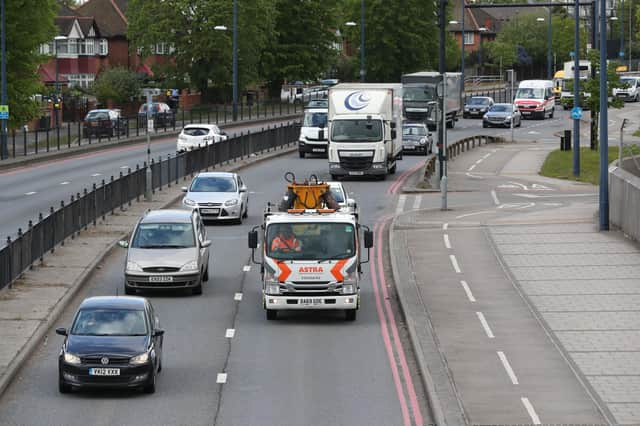Richmond transport emissions fell by record amount in 2020


Emissions caused by cars, trains and other vehicles in Richmond fell by a record amount in 2020, new figures show.
Friends of the Earth said though a national drop in transport emissions is not surprising due to successive lockdowns during the first year of the coronavirus pandemic, the Government should do more to encourage people to switch to electric vehicles or ditch their cars entirely as emissions rebound.
Advertisement
Hide AdAdvertisement
Hide AdDepartment for Business, Energy and Industrial Strategy figures show transport – including cars, trains and other modes of travel – caused 176 kilo-tonnes of carbon dioxide equivalent (ktCO2e) emissions in Richmond in 2020.
This was down from 214 the year before and the largest decrease since 2005, when records began – that year, transport emissions hit 286 ktCO2e.
Carbon dioxide equivalent determines the amount of CO2 that would need to be emitted to equal the same global warming potential of other produced greenhouse gases.
Road vehicles accounted for 97% of transport emissions, while diesel-powered trains produced none.
Advertisement
Hide AdAdvertisement
Hide AdAcross the UK, the carbon footprint caused by transport dropped by a record 23,350 ktCO2e (18%), from 130,021 to 106,671.
Friends of the Earth attributed the dramatic fall to the general public travelling less during lockdown.
Mike Childs, head of policy, said rebounding traffic levels are now contributing to the Government's struggle in meeting its climate targets.
The Government pledged to cut emissions by 78% by 2035 compared to 1990 levels and reach net zero by 2050.
Advertisement
Hide AdAdvertisement
Hide Ad"Ministers must do more to help people switch to electric vehicles or, better still, encourage them to leave their cars at home by providing better public transport and making it safer to walk and cycle," added Mr Childs.
"This would boost our energy security, cut soaring bills and slash the dangerous emissions that are warming our planet."
A Government spokesperson said: "We have committed unprecedented funding to encourage walking and cycling, as well as to accelerate the roll-out of electric vehicles – both vital steps to reaching our world-leading net zero targets.
"This includes the £2.5 billion rollout of zero-emission vehicles and charging infrastructure across the country, ensuring the switch is as simple as possible for motorists."
Advertisement
Hide AdAdvertisement
Hide AdNationally, 377,680 ktCO2e of greenhouse gases were emitted in 2020 – down from 416,168 the year prior.
Richmond's total greenhouse gas emissions fell to 591 ktC02e in 2020, down 9% from 591 the year before.
Of this, 30% was caused by transport, while commercial emissions accounted for 10%, industry produced 4% and domestic use 50%.
The average person in Richmond produced three tCO2e in 2020.